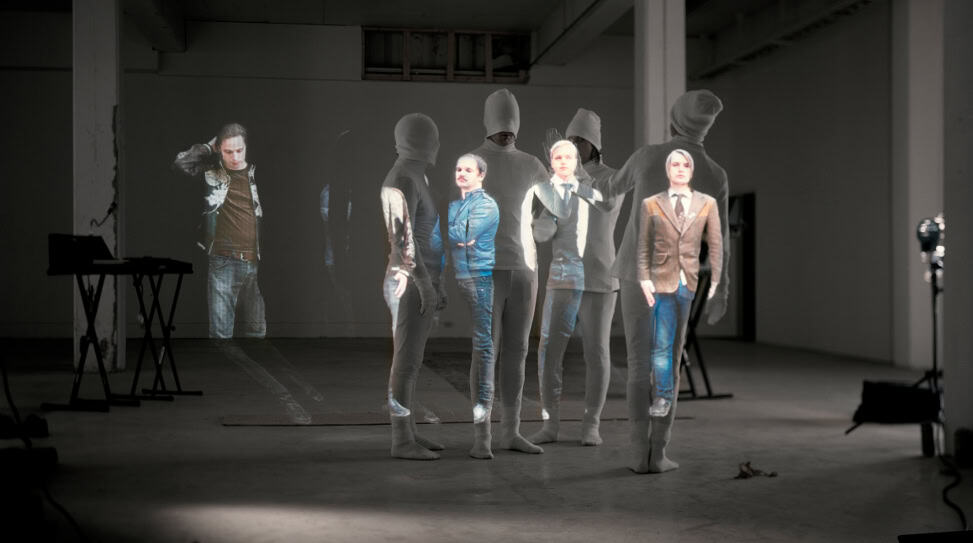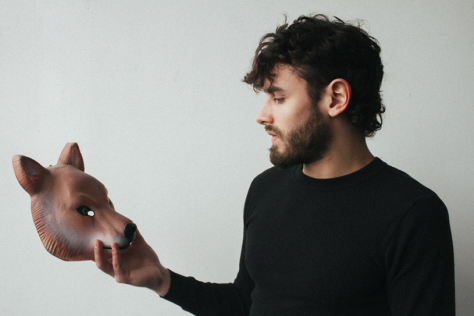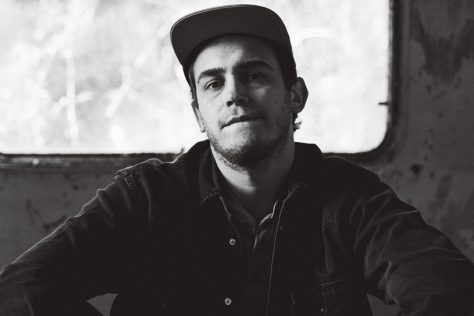It’s been over five years since we last heard from Oslo’s 120 Days, but the wait was well worth it: the quartet is back with a new album (simply called II) that’s oozing with the dance-leaning kraut sound we all came to love with their debut. The only difference this time around is that the guys embraced technology fully and, instead of recording in an old school fashion (direct to tape), they incorporated a pile of samples and plenty of MIDI-sequenced beats, making II more of a club-oriented fist-pumper than you might’ve anticipated.
We sat down with frontman Ådne Meisfjord to chat about what they’ve been up to over the past half-decade, the Norwegian scene, their roots, and more! Read on for the full Q&A…
So, it’s been five years or so since the first record and this new one. What happened during that time?
Well, the thing was that, after the first record, we toured quite a lot for a couple of years. Being on tour in a band―it’s an intense experience. When we got back to Oslo and tried to start working on another album, the vibe wasn’t really there and we were kind of sick of each other. So we decided to do some different stuff for a while and agreed to pick up 120 Days when it felt right again. I played with Serena-Maneesh. After a while, I guess we started missing playing together and started rehearsing again and we decided to do it… and start working on the second album.
What were you missing about 120 Days that you did have in the other projects?
We never thought that we gave up on the band and always knew there was music left within that constellation of people. It wasn’t really a conscious decision of getting back together… or even taking a break. It just kind of gradually happened.
One of the things I learned recently was that you’ve been around since 2001.
I don’t think a lot of people were aware of us back then. That was the very beginning.
Okay, but, still, it was the four of you and you went by what name?
We were called the Beautiful People.
Tell me a little about how you all met and what the genesis of that all was.
We all came from a small town on the northwest coast of Norway―it’s called Kristiansund. We met in school and Kristiansund is that kind of place where [meeting like-minded people] who’re into music outside of the mainstream is [sort of rare]. And when you meet those people, you form pretty intense relationships with them… you feel like the group against everyone else.
In the beginning, [we made the band out of] the despair of living in a small town in Norway with really nothing happening. The one thing we all really liked was playing in a band. So, when we finished school, we all moved to Oslo, which is when it all really started happening. We got introduced to more music and more people and felt like we maybe weren’t all that weird for liking, say, the Velvet Underground.
I guess that’s part of the joy of moving to the big city. Since you brought up Oslo, though, I wanted to ask about the scene over there. There’re a good number of bands and record labels that we as Americans are aware of, but I’ve never gotten a good sense of what the scene is like there.
I think 120 Days is a bit in-between “cliques.” We have ties to the Oslo indie scene like Serena-Maneesh, but [it’s not just that]. The big things in Oslo are, like, the indie rock stuff and the space disco, and I guess we have a bit of both. We’ve got that electronic rock feel, but there’s also a disco thing there, too. When it comes to the scene in Oslo, I’d say there’re a few very interesting bands and producers around, but it’s a small city, after all―there’re less than a million people living here. We all get along. If you’ve lived here for a while and are in a band… everyone knows everyone!
I’m a huge fan of all the Smalltown Supersound stuff and was curious as to how you hooked up with them and Joakim Haugland.
I guess it was through people we knew. He had heard the Beautiful People EPs and was curious [about us]. This was around the time when the Smalltown Supersound label went from being more of an art scene noise and jazz label to more… like, disco and Lindstrøm and diskJokke and the rest of the stuff they’re putting out now. It was a time of change.
And then Smalltown released the first album. Are they putting out this one?
No, the second one’s not coming out with them [but on Voices of Wonder]. It probably has a little bit to do with the fact that we waited fucking five or six years between albums. We might’ve pissed off at least some of the people we worked with if not all of them. I completely understand that, but, at the same time, you can’t really think about that when you’re making music. There’s music everywhere and if you’re going to put out an album, it should be something that you think is really good.
Yeah, and, I mean, oftentimes, especially with bands that take a break―even a little bit of a break, like two years―people think it’s weird. These days, I see a lot of people just constantly working on music and then shopping records around as they come since there isn’t that dependable anymore on either side.
I guess it’s all part of the crazy music industry times we’re living in. No one really knows what’s going on. So I try as best I can to just focus on making good music and the rest I take as a bonus.
I don’t want to talk too much about labels, but while I’m on the topic, how did you connect with Vice?
One of the guys at Vice had been given one of the Beautiful People EPs and, one day, this email came to our inbox saying, like, Hey―we’re from Vice and we’re thinking about signing you. They were on it long before anyone else in Norway was wanting to put out a 120 Days album. We got to [the American market] in a roundabout way―it wasn’t like we were big in Norway and then we got picked up in the States.
So, in terms of your songwriting and production, how do you guys actually write your songs and then record them in the studio? What’s the process?
It’s always been really important to us to have an open mind [when it comes to the process]. We’re not the kind of band that rehearses our songs and then we go into the studio and then we play our parts and we’re done; there’s always lots of experimentation and testing out of new ideas. In the beginning, we fumble around in the darkness and build around whatever catches out interest. It’s an ongoing experiment, making an album… it’s not like we ever really know where we’re going. I think the only thing we’ve ever been sure of is that we never wanted to be sure of anything before we started working. The process of writing a song is the same as the process of recording a song.
Do you guys have musical backgrounds or did you just pick it all up over the years?
Like I said, when we were living in Kristiansund, the four of us were part of a very small group of people who were into music outside of the mainstream and that’s what [originally brought us together]. So we kind of learned how to play our instruments by doing it in the band. Because of that we have a pretty special connection when it comes to musical understanding together―we don’t need to debate and discuss everything because we’ve been through this journey together.
There’s a lot of similarities between the first album and II, but there are also a lot of differences… you’ve sort of enhanced the dance elements and clearly started playing around with more instruments and equipment. What do you think has changed?
There’s less guitars on the second album. It’s been five years so it’d be even stranger if it was exactly the same, but, yeah, the biggest difference, I’d say, is that we embraced technology with this one. The first one was recorded in an old school rock fashion and to tape―there was no MIDI synchronization and very little computer editing. This time, though, we really embraced [technology] and used a lot of sequencing and samples and stuff like that. And, because of that, it’s became more electronic and club-oriented.
Where was this one recorded
A bunch of different places, actually. Some of the sessions were in our own studio… then we did some of the sketches in more expensive studios… then, like, the intro for “Lucid Dreams” was recorded in my living room using my laptop microphone. There’s everything from that very lo-fi [aesthetic] to the extreme, million-dollar-microphone studio in there. [Laughs]
The first thing that came out with this record was the Modular Club Mod 12” release of “Osaka.” That was a bit of surprise to me because I wouldn’t’ve associated you with Modular and didn’t expect you to drop a dance single to basically announce the album. Tell me a bit about that!
I hate to be boring, but it’s pretty much the same story [as the others]. They heard the album and really liked that song. We thought it would be cool to come back with something a bit different after being gone for so long.
What sort of music are you influenced by?
It’s safe to say I have a very eclectic taste in music. I’m a big fan of old kraut rock from the 70s and you can hear that on both albums. In terms of new influences… that would be more like modern techno―the Detroit scene from the 80s and 90s. Underground Resistance is one of my ultimate favorite bands of all time. (Or whatever you want to call them―label, collective, band… ) But also, like, I’m into really avant-garde jazz from the 70s like Alice Coltrane and Pharaoh Sanders and Miles Davis fusion albums…
How do you approach writing lyrics as opposed to the instrumentals?
It’s very different, writing lyrics. Music is something that comes very naturally―if I sit down with a synthesizer or anything, it’ll come to me and work its way out by itself. With lyrics, it’s harder and more of a struggle. For this album, I’ve been influenced a lot by dreaming and the sense of unrealness. I like lyrics to not be complete gibberish but also to not be too understandable, either. Like when you wake up from a dream and you kind of remember it but you don’t and it drifts away…
I think I gotcha.
I’m intrigued by the unreleaness but realness of dreams.
Are you guys total nerds when it comes to equipment or do you have a spartan setup?
No, we’re kind of nerds when it comes to synthesizers. [Laughs] We’ve got a pretty fair collection of old analog beasts. We’ve got the Juno-60, the Korg MS-10, the Korg MS-20, the very rare Korg VC-10 Vocoder, and some old Roland SH-1000s―this probably means nothing to you!
No, no, no! It does! I’m glad to hear you have such an awesome spread!
With new synthesizers, I bought the new Moog Voyager, which is, like, a remake of the Minimoog, but with MIDI options and a digital interface.
Alright, so―what’re your plans for 2012?
Basically, we’ll be touring through Europe in the spring and then, hopefully, we’ll be able to get a U.S. tour going in the fall. Then we’ll see if we can get some new material going and not wait five years this time.
And the final question: What does your name mean?
It’s an old Norwegian name that means “eagle.”
Oh, wait, no―I meant 120 Days! But that’s cool, too, man!
[Laughs] No, okay, 120 Days is from the old Marquis de Sade novel, The 120 Days of Sodom. Most people think it’s from the Pasolini movie, but we hadn’t seen that when we named the band. I went through a phase of reading, like, classic pornography for a while and that one is, by far, like, the weirdest, craziest, evilest around. I kind of liked the name because “120 days” doesn’t mean anything good or bad unless you dig a little.
Do you identify with that? Like, you’re dark and weird underneath or something?
[Laughs] I don’t want to sound too pretentious, but I guess that was kind of the appeal. Like… we’re really, really, really bad with names. When we had to change names [from Beautiful People] it took over a year and we almost went with Sex Beat after the Gun Club song. I’m glad we ended up with 120 Days, which, I guess, was sort of a response to having a really in-your-face name―[ours] is crazier if you dig a bit beneath the surface.

 Vital Stats: Allan Rayman
Vital Stats: Allan Rayman American Spirit: Henry Grace
American Spirit: Henry Grace
No Comments